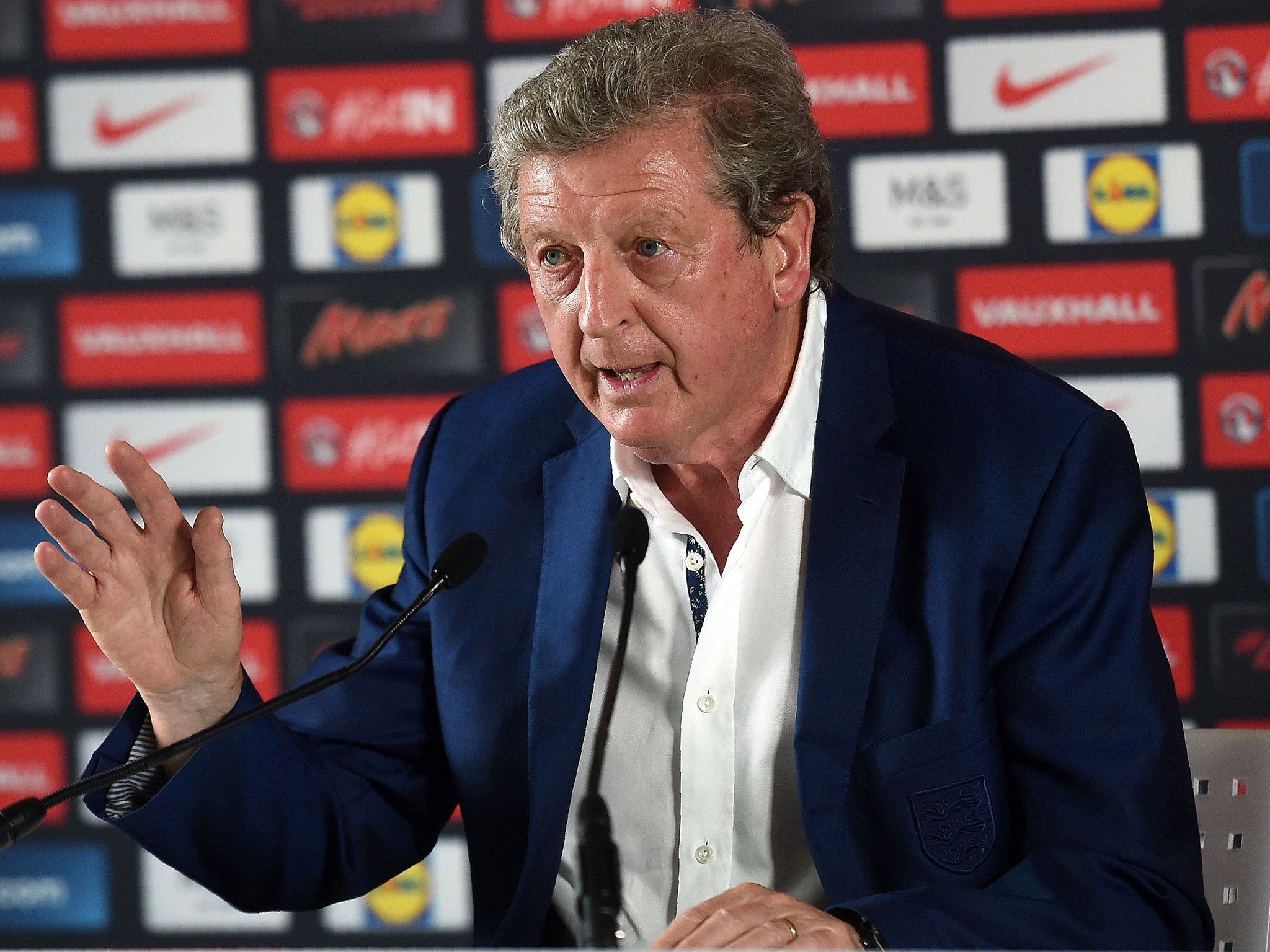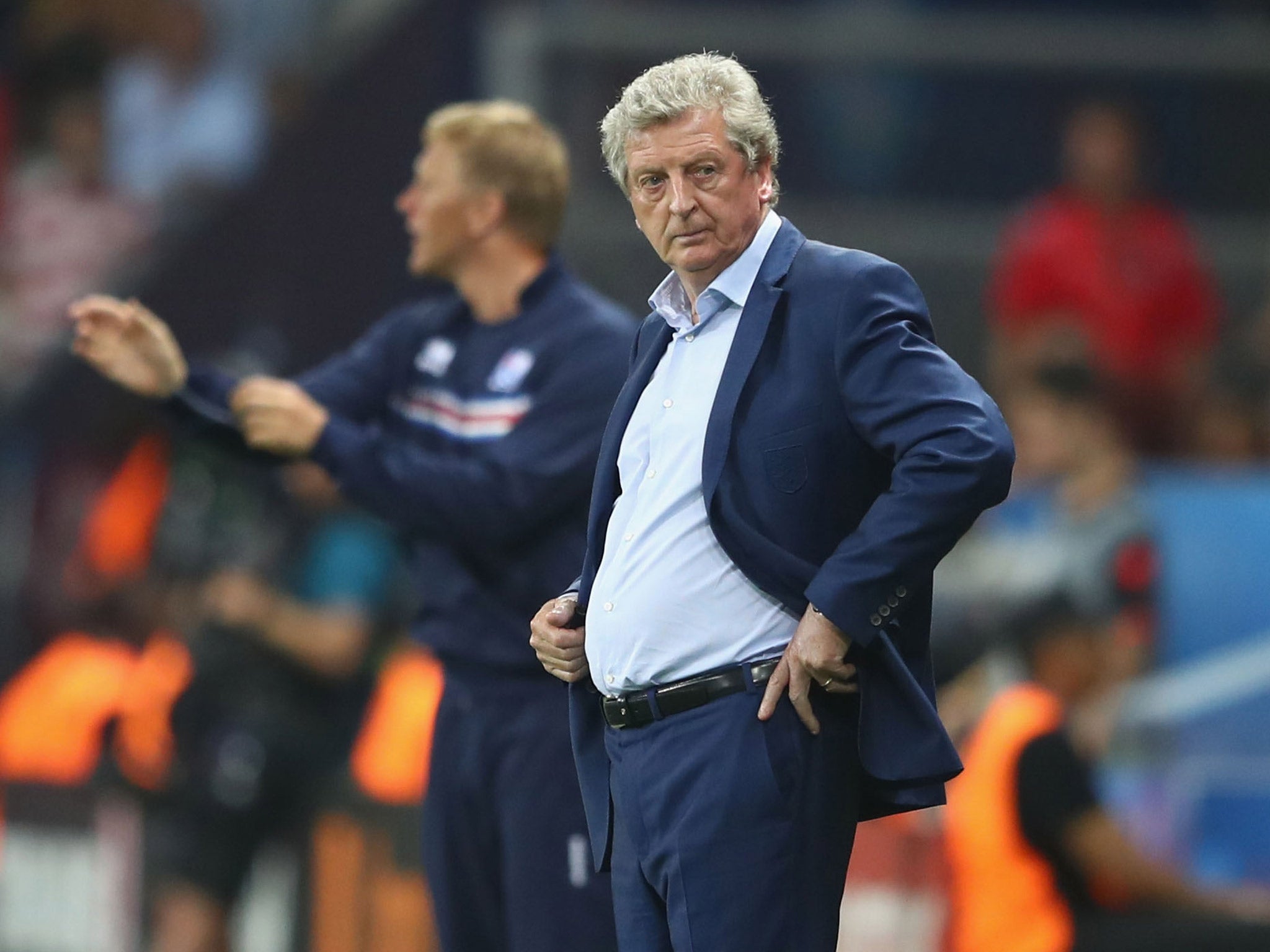Roy Hodgson resigns: Manager's last press conference was an exercise in England's self importance
For a man with such a sense of his own footballing stature and expertise as Hodgson, this would have stung him deeply

Your support helps us to tell the story
From reproductive rights to climate change to Big Tech, The Independent is on the ground when the story is developing. Whether it's investigating the financials of Elon Musk's pro-Trump PAC or producing our latest documentary, 'The A Word', which shines a light on the American women fighting for reproductive rights, we know how important it is to parse out the facts from the messaging.
At such a critical moment in US history, we need reporters on the ground. Your donation allows us to keep sending journalists to speak to both sides of the story.
The Independent is trusted by Americans across the entire political spectrum. And unlike many other quality news outlets, we choose not to lock Americans out of our reporting and analysis with paywalls. We believe quality journalism should be available to everyone, paid for by those who can afford it.
Your support makes all the difference.The English air of superiority lingered to the very bitter end. By mid-afternoon on Tuesday, Roy Hodgson had resisted three suggestions from the Football Associations that it would be wise to appear in public and answer for the greatest humiliation in the national football team has known.
Then, in keeping with the thought processes of his past three weeks, he changed his mind. He was persuaded that he risked carrying accusations of cowardice into the years of his retirement if he didn’t show.
Hodgson’s subsequent appearance did painfully little for the way he will be remembered in the years to come, though. It was a case study in how not to do humility: 20 minutes of vivid theatre which were at once incredibly sad, because this was no way for anyone to draw down the curtain on a 40-year career, yet also so full of such resentment and umbrage that you wanted to shake the man and say: “Stop this. Will you listen to yourself.”
“I don’t really know what I’m doing here,” he began. “But I was told it was important for everybody I appeared …” He was already smarting by then, having suffered the indignity of sitting silently beside the Football Association chief executive Martin Glenn and hearing him discuss the “brittleness” of the football team England had fielded and declare: “Roy, Iceland is not your epitaph.”
For a man with such a sense of his own footballing stature and expertise as Hodgson, that would have stung him deeply. His eyes scanned the packed press conference room as the boss’s assessment of him was delivered and suddenly he looked very old. It would have been a forlorn task to brief the 68-year-old in the benefits of humility in mitigating what had befallen England, so what unfolded was a sequence of statements to make you flinch.
It was not “a matter for the public,” what he had said to the players at half time. He was “raw.” He didn’t know if he had regrets. An opportunity to apologise came and went. And then we were back to his reasons for not wanting to be here. “I maintain I’m unhappy about it because it’s no longer my job,” he said.
“I don’t want to come here as Uriah Heep and I certainly don’t want to come here in a bolshy way either.” The Dickensian reference as a fleeting reminder of the delights of the conversations with Hodgson these past four years and something we will miss: the quirky cultural allusions and colour.
But “bolshy” he was, even as he protested the opposite. “I hope you’re happy with it,” he said of the press conference, as he concluded it.
“If you’re not I make no apologies. I leave you to your stories…” In so many, this superiority complex was a metaphor for what we have seen in England here: the characteristic which, for many people, makes them so very hard to love. They process through the tournament mixed zones with the smouldering, humourless air of superstars. They are the only nation who seem to need the French army to guard the perimeter fence of their base as well as armed French police.
Most of the competing nations have trained the night before each match in the stadium where they are to play, creating an opportunity for photographers to do their work. England have done so in the cloistered seclusion of Chantilly base - then undertaking what has been royally called a ‘walkabout’ on the stadium pitch. Uefa let this ride.
When Glenn, whose handling of the indignity was otherwise excellent, said on Tuesday that managing the England team was the hardest football job in the world he again gave voice to the vast English self-importance. It was the hubris that did for the team in the end and, in retrospect, made what L’Equipe described on Tuesday’s edition as L'incroyable fiasco anglais somewhat less than incredible.
Rather than scout the Iceland team in the game against Austria which set in train the round of 16 fixture which will be remembered in perpetuity, Hodgson and this assistant Ray Lewington took a boat trip down the River Seine. His staff did not seem inordinately worried by the Icelanders anyway, judging by the way they leapt up to celebrate when the side’s last minute goal against Austria meant that it was them, rather than Portugal, England met in Nice.
What hubris there was in that elation. Hodgson’s fudge and muddle underpin this fiasco, of course. To the very end, he didn’t know how the pieces fitted together and there was no more graphic sense of the sense of it than Wayne Rooney only discovering that he had been dropped to the bench for the Slovakia game when Hodgson read out the team sheet in Saint Etienne.
Rooney, who was under the impression that Hodgson had acceded to his request to play every game, was stunned. The captain had imagined there would have been a quiet word at least. That Hodgson should have thought the Slovaks would be swept away by a starting XI minus Rooney and Dele Alli only goes to show the high and mighty air, though when it came to the half-cocked attempts to build a team spirit, their hearts weren’t in it.
The squad rules stated that Leo the Lion was the forfeit for any player guilty of a misdemeanour. It even had its own accreditation. Jack Wilshere forgot it after the Slovakia game and had to go back for it. Joe Hart brought it to Nice but didn’t leave the stadium with it. The players operated in a bubble while the ill-fated campaign lasted - eating separately from the Football Association staff, seemingly only stopping to talk in the player/media mixed zones when down on the list to do so.

The few who have been asked to break the rota didn’t want to know. There was no more graphic sense of the detachment from the real world than when Harry Kane was asked about the European referendum vote on Friday, as the continent convulsed with news of the outcome. “I've not really thought too much about it yet,” Kane replied, when asked. No player could add much more on the subject.
It was not encouraging for those harbouring hopes that this England side might be full of energy, ideas, fun and alive to independent thought and the wider world. These qualities are not irrelevant to what you require on a football field when there is a problem. Those who followed the side through the first week, from Marseilles to Lille, knew all about that superiority at street level, too. The soundtrack of the first games was the English army of occupation with the songs of the war and the RAF.
"I didn't see - and the players didn't see - the sort of performance that we gave last night," Hodgson said as he bowed out. “We even believed if we got to the quarter-final we could go beyond that.” Ridiculous, deluded, over-inflated belief, from first to last.
Join our commenting forum
Join thought-provoking conversations, follow other Independent readers and see their replies
Comments